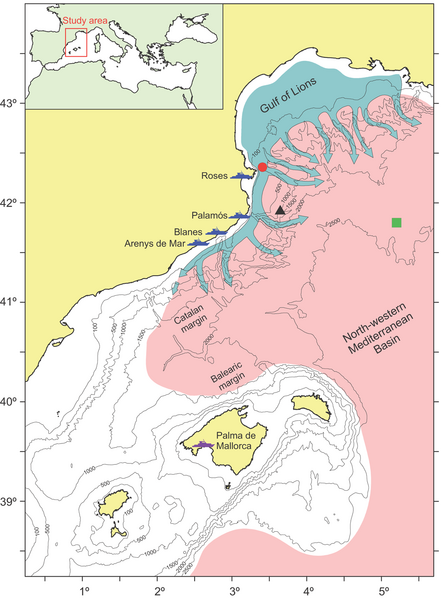In an PLoS ONE article, Joan B. Company and colleagues at the Institut de Ciències del Mar (CSIC) in Spain describe a mechanism of interaction across ecosystems showing how a climate-driven phenomenon originated in shelf environments controls the biological processes of a deep-sea living resource.
The progressive depletion of world fisheries is one of the key socio-economical issues of the forthcoming century. However, amid this worrying scenario, Company’s study demonstrates how a climate-induced phenomenon occurring at a decadal time-scale, such as the formation of dense shelf waters and its subsequent downslope cascading can repeatedly reverse the general trend of overexploitation of a deep-sea living resource.
Strong downslope currents associated with intense cascading events displace the population of the shrimp Aristeus antennatus from the fishing grounds, producing a temporary fishery collapse. However, nutritive particles brought by cascading waters to deep regions cause an enhancement of its recruitment process and an increase of its total landings during the following years.

These new findings resolve the paradox of a long-overexploited fishery that has not collapsed after 70 years of intense deep-sea trawling. The results will have a high socio-economic impact, since this species is the most valuable deep-sea living resource in the Mediterranean Sea. Because the cascading of dense water from continental shelves is a global phenomenon whose effects on biological processes were not considered in the past, it is hypothesized that its influence on deep-sea ecosystems and fisheries worldwide should be more important than previously thought.
In this sense, applying the findings to a global fishery scenario, shelf water cascading sites identified worldwide could be considered as regions favorable for deep-sea demersal fisheries, just as the upwelling zones are considered favorable regions for pelagic fisheries. This paper is particularly timely, since these new results will be of special relevance to the current debate on the shift from shelf to deep-sea fisheries.
Citation: Company JB, Puig P, Sardà F, Palanques A, Latasa M, et al (2008) Climate Influence on Deep Sea Populations. PLoS ONE 3(1): e1431.doi:10.1371/journal.pone.0001431






Comments